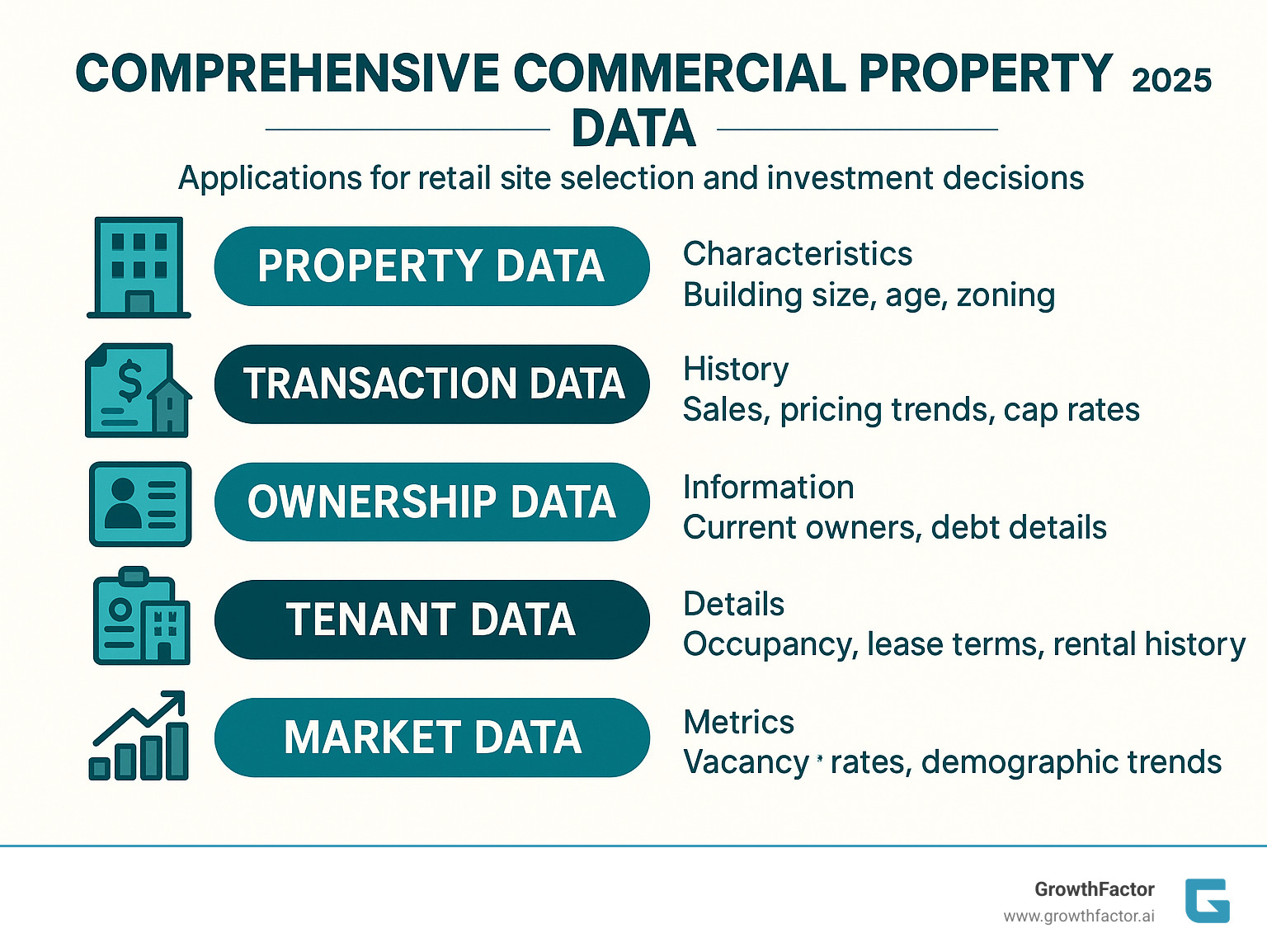Commercial Property Data Guide: Compare Top AI Platforms (2025)
Written by: Clyde Christian Anderson
The Power of Data in Commercial Real Estate

Commercial property data is the foundation of smart real estate decisions. It encompasses property characteristics, ownership details, transaction history, tenant data, and market trends that guide investors, developers, and retailers in buying, selling, or leasing properties.
Key Types of Commercial Property Data:
- Property Data: Building size, age, zoning, location details
- Transaction Data: Sales history, pricing trends, cap rates
- Ownership Data: Current owners, contact information, debt details
- Tenant Data: Occupancy rates, lease terms, rental history
- Market Data: Vacancy rates, absorption trends, demographic insights
The U.S. commercial real estate market reached $1.2 trillion in revenue in 2022, yet many professionals still rely on manual data collection. As one industry expert noted, "No matter the industry... the conversation will almost always point back to one thing—data. In commercial real estate, data makes all the difference."
For retail chains expanding rapidly, evaluating hundreds of potential locations quickly and accurately is a major challenge. Traditional methods are too slow when prime locations disappear overnight. Access to the right data at the right time is what separates successful retailers from struggling ones.
I'm Clyde Christian Anderson, Founder and CEO of GrowthFactor.ai. We've helped retailers evaluate over 3,250 sites in the last 6 months using AI-powered commercial property data analysis—with customers like Cavender's seeing 3x growth (27 stores in 2025 vs 9 in 2024). My background, from retail warehouses to investment banking, provides deep insight into how data transforms location decisions.

The Ultimate Guide to Commercial Property Data
Think of commercial property data as your crystal ball for real estate decisions. It's the difference between guessing and making precise, informed moves that pay off.
What Types of Commercial Property Data Are Available?
Comprehensive commercial property data paints a complete picture of every building, transaction, and market opportunity. Key data types include:
- Property characteristics: The foundation of analysis, including building size, location, age, and construction materials. For instance, the average U.S. commercial building is 54 years old, but chain drug stores average just 24, highlighting nuances that reveal hidden opportunities.
- Transactional history: The story of past sales, including prices, dates, and previous owners. This data reveals pricing trends and helps estimate potential returns.
- Ownership and debt data: This information identifies current owners, their contact information, and debt details like mortgage amounts and lenders. Loan maturity dates are particularly valuable, as they often signal upcoming sale or refinancing opportunities.
- Tenant information: The heartbeat of a property, this includes current and past tenants, lease terms, occupancy rates, and rent rolls, which indicate a building's stability and cash flow potential.
- Market metrics: The big-picture context, including rental rates, vacancy rates, and absorption rates (how quickly space is leased). This data is crucial for forecasting market shifts.
- Zoning regulations: A make-or-break factor for development, zoning determines what you can build, how tall, and how dense. Knowing these rules upfront saves time and money.
Commercial property data differs significantly from residential data. Commercial valuation hinges on income generation (cap rates, net operating income), not just comparable sales. Tenant analysis is far more complex, and financing involves commercial mortgages that require deeper analysis.
At GrowthFactor, we integrate all these data types into our AI-powered platform, giving retail teams the comprehensive information they need. For more on how AI processes these datasets, explore More on AI for Real Estate.
Where to Find Reliable Commercial Property Data
Finding reliable commercial property data is like a treasure hunt. The sources range from public records to sophisticated data platforms.
Public records are the bedrock of property intelligence, found in county offices across the U.S. Key sources include Assessor databases (property details), the Registry of Deeds (sales and mortgage data), building permits (development pipelines), and zoning codes. However, raw public records are often fragmented, inconsistent, and lack the depth needed for modern analysis.
This is where specialized commercial property data platforms like GrowthFactor transform the game. We aggregate data from hundreds of sources, cleaning and enhancing public records with proprietary insights on tenants, building usage, and risk scores. We solve common data headaches, delivering a complete and accurate property picture. Other sources like brokerage reports and legal notices also provide valuable market insights.
The real advantage of a platform like ours is integration. We bring geographic, life event, and distressed property data into one searchable system. Our AI Agent Waldo analyzes properties using location intelligence and foot traffic data unavailable in public records alone. For a deeper look at this, check out More on Real Estate Location Intelligence.
How to Use Data for Market Analysis and Valuation
With comprehensive commercial property data, you can turn numbers into profitable decisions.
Market trend analysis starts with tracking key indicators. Vacancy rates show available space, rent tracking reveals demand strength, and absorption rates measure how quickly space is leased. We also monitor construction pipelines and economic indicators, such as local employment figures from sources like the U.S. Bureau of Labor Statistics, to provide crucial market context. For example, data clearly shows opportunity in the industrial sector (4.6% vacancy, strong rent growth), while the office sector has struggled.
Property valuation combines art with science, and data provides the scientific foundation.
- Capitalization rates (cap rates) measure expected returns (Net Operating Income / Asset Value).
- Sales comparables use recent sales of similar properties to benchmark valuations.
- Estimated market values adjust assessed values based on recent area sales.
- Proprietary risk scores, like those on our platform, assess mortgage default, insurance, and new buyer risk, offering unique valuation perspectives.
Data analysis helps you understand not just current worth, but future potential. Our AI-powered tools can turn months of analysis into a few clicks. To see how AI can improve your market analysis, explore More on Real Estate Market Analysis AI.
Identifying New Business and Off-Market Opportunities
Commercial property data is your secret weapon for uncovering deals others miss, especially "off-market" properties that offer a competitive edge.

Finding off-market properties means proactively identifying deals before they hit public markets. Our platform lets you use over 250 criteria to target owners of unlisted properties that match your buyer's needs.
Targeting motivated owners becomes strategic when data reveals who might be willing to sell. This includes absentee owners, recent cash buyers, corporate owners, and owners of distressed properties (identified through pre-foreclosure data or high-risk scores). Tracking loan maturity dates is another goldmine, as it signals when owners will likely need to sell or refinance.
Predictive analytics takes this further. Our AI uses algorithms to identify properties and owners most likely to transact soon, focusing your efforts on the most promising leads.
Data-improved property scouting also transforms "driving for dollars." Our mobile app and AI Agent Waldo provide on-the-spot details for any property, including ownership and off-market potential. This allows teams to evaluate five times more sites efficiently, turning every drive into a business opportunity. For more on this, explore More on AI-Powered Retail Analytics.
Comparing Commercial Property Data Platforms in 2025
Not all commercial property data platforms are created equal. Here's how the leading providers compare for retail site selection and commercial real estate analysis in 2025:
| Platform | Best For | Key Strengths | Pricing |
|---|---|---|---|
| GrowthFactor | Retail site selection, multi-unit expansion | Glass box transparency, AI Agent Waldo, all data in one place, expert analysts on-demand, no seat limits | Starter $200/mo, Core $1,000/mo, Enterprise custom |
| CoStar | Commercial brokerage, office/industrial | Largest database, comprehensive listings, market research | $5,000-$15,000+/year |
| Reonomy | Property prospecting, owner identification | AI-powered search, ownership data, off-market deals | $1,500-$5,000+/year |
| Moody's Analytics REIS | Institutional investors, market forecasting | Economic forecasts, market analytics, research reports | $10,000-$50,000+/year |
| Placer.ai | Foot traffic analysis, competitive intelligence | Mobile location data, visitor analytics, trade area insights | $1,000-$5,000/mo |
What Makes GrowthFactor Different?
While legacy platforms like CoStar and Reonomy focus on broad commercial real estate data, GrowthFactor is purpose-built for retail site selection and multi-unit expansion. Key differentiators include:
- Glass box, not black box: See exactly why a site scores the way it does—transparent, auditable insights vs. opaque algorithms
- All data in one place: Demographics, foot traffic, vehicle traffic, competition, and analogs—no more juggling multiple tools
- Setup in a day, not weeks: Fast onboarding vs. months-long enterprise implementations
- Custom scoring models: Models trained on YOUR stores' actual performance, not generic industry averages
- No seat limits: Bring your entire team under one organization at no extra cost
- Expert analysts on-demand: Unbiased human verification layer that software-only platforms lack
Proven Results: Cavender's Western Wear opened 27 new locations in 2025 (vs. 9 in 2024 pre-GrowthFactor). Books-A-Million saves 25 hours per week. TNT Fireworks reviews 10x more sites in committee. Overall, customers using GrowthFactor are evaluating 5-10x more sites per cycle.
Navigating Market Challenges and the Future of CRE Data
The commercial real estate market is dynamic, and data is the compass for navigating challenges and charting a course for future success.
Overcoming Market Volatility with Data-Driven Decisions
The U.S. commercial real estate market is experiencing significant volatility, making data-driven decisions more critical than ever.
Current Challenges:
- Economic Headwinds: Soaring interest rates and a sluggish economy have slowed investment activity.
- Negative Returns: 2023 saw the first year of negative returns for investment properties since 2009, with only a slight recovery expected in 2024.
- Office Sector Depreciation: Asset values fell 8.5% year-on-year as of Q1 2025, driven by the shift to hybrid work.
- Increased Vacancy Rates: Vacancy has generally increased since 2021, signaling oversupply in some segments.
These challenges highlight the need for robust risk monitoring. Our platform's proprietary risk scores help clients identify properties with high default risk, enabling informed lending and acquisition decisions.
How Data Helps Steer: Despite headwinds, data provides clarity. It helps investors:
- Identify Resilient Sectors: While offices struggle, data points to resilience in the industrial and hospitality sectors.
- Invest Strategically: Data uncovers undervalued properties and submarkets ready for recovery.
- Diversify and Hedge: Commercial real estate remains a key asset for portfolio diversification and hedging against inflation. Data helps find the right properties to achieve these goals.
- Understand Local Nuances: Granular data reveals key differences between markets, such as Nashville's low 3.3% vacancy rate versus San Francisco's 32% office vacancy.
Data transforms uncertainty into calculated risk, allowing us to adapt strategies and thrive in volatile conditions. To learn more, explore More on AI Real Estate Market Analysis.
The Rise of AI in Commercial Real Estate
The future of commercial property data is the intelligent application of artificial intelligence (AI). AI is a transformative force providing unprecedented efficiency and insight.

AI-Improved Platforms for Automated Site Selection: Traditionally, site evaluation was a manual, time-consuming process. AI changes everything. Our AI-powered platform streamlines this by rapidly processing vast amounts of data—from property values and traffic flows to complex demographic data.
Predictive Modeling and Improved Efficiency: AI's ability to analyze patterns and predict outcomes is a game-changer. Our AI Agent Waldo can automatically qualify and evaluate sites 24/7 based on hundreds of criteria. This predictive analytics capability helps forecast which properties will transact and which markets will grow, uncovering hidden opportunities.
The impact on efficiency is profound. Our AI Agent Waldo enables teams to evaluate five times more sites efficiently. This combination of speed, accuracy, and scale helps rapidly expanding retail chains secure prime locations faster than the competition.
Benefits of Specialized Commercial Real Estate Databases (with AI): AI-powered databases offer numerous advantages:
- Comprehensiveness: They integrate data from countless sources for a holistic view.
- Accuracy and Recency: Data is continuously updated and verified.
- Advanced Analytics: They provide tools for trend analysis, valuation, and risk assessment.
- Efficiency and Automation: AI automates tedious data tasks, freeing up professionals for high-value work.
- Targeted Opportunity Identification: They enable highly specific searches for on- and off-market deals.
- Improved Decision-Making: Actionable insights help mitigate risk and maximize returns.
- Competitive Advantage: Superior data and analytics provide a significant edge.
At GrowthFactor, we provide cutting-edge solutions for the retail real estate industry in the USA, including Boston, MA, and Cambridge, MA. Our flexible plans—Starter from $200/month for growing retailers, Core from $1,000/month for expanding brands, and Enterprise with custom pricing—are designed to make data understandable and actionable. To see how AI can transform your team's process, Learn how AI transforms site selection for real estate teams.
Frequently Asked Questions About Commercial Property Data
What is commercial property data?
Commercial property data is comprehensive information about non-residential real estate, including property characteristics (size, age, zoning), transaction history (sales, prices, cap rates), ownership details, tenant information (occupancy, lease terms), and market metrics (vacancy rates, rental trends). This data helps investors, developers, and retailers make informed decisions about buying, selling, leasing, or developing commercial properties. Unlike residential data, commercial property data focuses on income generation potential and requires more complex analysis of tenant stability, lease structures, and market dynamics.
What are the best commercial property data providers in 2025?
The best commercial property data providers in 2025 depend on your use case:
- GrowthFactor is best for retail site selection and multi-unit expansion, offering AI-powered analysis with transparent glass-box scoring, transparent "glass box" scoring, and expert analysts on-demand. Pricing starts at $200/month.
- CoStar is the largest database for commercial brokerage and office/industrial properties, with comprehensive listings and market research ($5,000-$15,000+/year).
- Reonomy excels at property prospecting and owner identification with AI-powered search ($1,500-$5,000+/year).
- Moody's Analytics REIS is preferred by institutional investors for economic forecasts and market analytics ($10,000-$50,000+/year).
- Placer.ai specializes in foot traffic analysis and competitive intelligence ($1,000-$5,000/month).
How much does commercial property data cost in 2025?
Commercial property data costs vary widely based on features and scope:
- Entry-level platforms: $200-$500/month for basic property data and analytics
- Mid-market solutions: $1,000-$5,000/month for comprehensive data, AI analytics, and collaboration tools
- Enterprise platforms: $10,000-$50,000+/year for institutional-grade data, custom integrations, and dedicated support
GrowthFactor offers Starter at $200/month (growing retailers under 10 locations), Core at $1,000/month (expanding retailers with 10+ locations), and Enterprise with custom pricing for large organizations. Unlike legacy platforms, GrowthFactor includes no seat limits—bring your entire team at no extra cost.
How can AI improve commercial property analysis?
AI transforms commercial property analysis in several ways:
- Speed: AI can evaluate hundreds of sites in minutes vs. weeks of manual analysis
- Accuracy: Machine learning models trained on actual store performance achieve higher prediction accuracy than traditional methods (GrowthFactor customers see customers like Cavender's seeing 3x growth (27 stores in 2025 vs 9 in 2024))
- Pattern recognition: AI identifies correlations between location factors and business success that humans might miss
- Predictive analytics: AI forecasts which properties will transact, which markets will grow, and how new locations will perform
- Automation: AI agents like GrowthFactor's Waldo can automatically qualify sites 24/7, generate reports, and surface opportunities
The result: teams evaluate 5x more sites, generate reports in ~2 seconds, and achieve 5-10x typical ROI on their data investment.
How does GrowthFactor compare to traditional data providers?
GrowthFactor differs from traditional commercial property data providers in several key ways:
| Feature | GrowthFactor | Traditional Providers |
|---|---|---|
| Transparency | Glass box—see exactly why a site scores the way it does | Black box—opaque algorithms |
| Data integration | All data (demographics, traffic, competition) in one platform | Often requires multiple tools |
| Setup time | Same-day deployment | Weeks to months |
| Scoring models | Custom models trained on YOUR store data | Generic industry averages |
| User licenses | No seat limits | Per-seat pricing |
| Human expertise | Expert analysts on-demand | Software only |
| Results | transparent glass-box scoring, 5-10x ROI | Varies widely |
Ready to see how GrowthFactor can transform your commercial property analysis? Schedule a demo to see the platform in action.
Citations
The human algorithm
Request Your demo
Schedule meeting
Or submit your information below and we'll be in touch to schedule.



